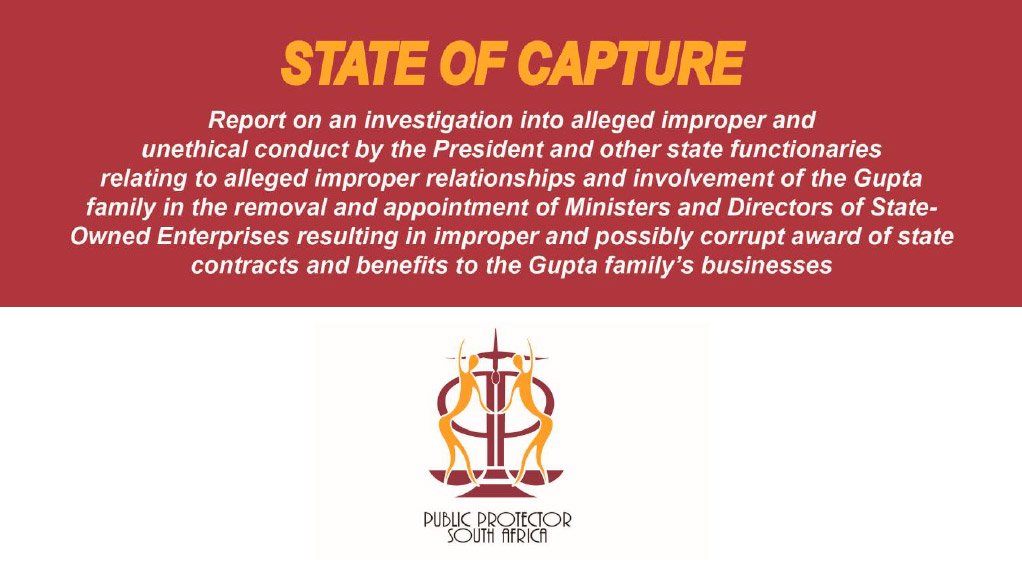- State of Capture report2.64 MB
The highly contentious "State Capture" Report was released on Wednesday following the court order from a bench of three High Court judges.
The report probed allegations that the controversial Gupta family – who have close ties with President Jacob Zuma – had undue influence on the appointment of ministers.
President Zuma on Wednesday withdrew a court application for an interdict against the immediate release of the so-called ''state capture'' report.
Summary of Remedial Action:
8.1. The appropriate remedial action I am taking in pursuit of section 182(1)(c) of the Constitution, with the view of placing the Complainant as close as possible to where he would have been had the improper conduct or maladministration not occurred, while addressing systemic procurement management deficiencies in the Department, is the following:
To the President:
8.2. The investigation has proven that the extent of issues it needs to traverse and resources necessary to execute it is incapable of being executed fully by the Public Protector. This was foreshadowed at the commencement of the investigation when the Public Protector wrote to government requesting for resources for a special investigation similar to a commission of inquiry overseen by the Public Protector. This investigation has been hamstrung by the late release which caused the investigation to commence later than planned. The situation was compounded by the inadequacy of the allocated funds (R1.5 Million).
8.3. The President has the power under section 84(2)(f) of the Constitution to appoint commissions of enquiry however, in the EFF Vs Speaker of Parliament the President said that: “I could not have carried out the evaluation myself lest I be accused of being judge and jury in my own case”.
8.4. The President to appoint, within 30 days, a commission of inquiry headed by a judge solely selected by the Chief Justice who shall provide one name to the President.
8.5. The National Treasury to ensure that the commission is adequately resourced.
8.6. The judge to be given the power to appoint his/her own staff and to investigate all the issues using the record of this investigation and the report as a starting point.
8.7. The commission of inquiry to be given powers of evidence collection that are no less than that of the Public Protector.
8.8. The commission of inquiry to complete its task and to present the report with findings and recommendations to the President within 180 days. The President shall submit a copy with an indication of his/her intentions regarding the implementation to Parliament within 14 days of releasing the report,
8.9. Parliament to review, within 180 days, the Executive Members’ Ethics Act to provide better guidance regarding integrity, including avoidance and management of conflict of interest. This should clearly define responsibilities of those in authority regarding a proper response to whistleblowing and whistleblowers. Consideration should also be given to a transversal code of conduct for all employees of the State.
8.10. The President to ensure that the Executive Ethics Code is updated in line with the review of the Executive Members’ Ethics Act.
8.11. The Public Protector, in terms of section 6 (4) (c) (i) of the Public Protector Act, brings to the notice of the National Prosecuting Authority and the DPCI those matters identified in this report where it appears crimes have been committed.
9. MONITORING
9.1 The Public Protector will monitor the implementation of the remedial action.
9.2 The Secretary of Parliament and the Director General in the Presidency are to provide periodic implementation reports to the Public Protector.
EMAIL THIS ARTICLE SAVE THIS ARTICLE
To subscribe email subscriptions@creamermedia.co.za or click here
To advertise email advertising@creamermedia.co.za or click here











